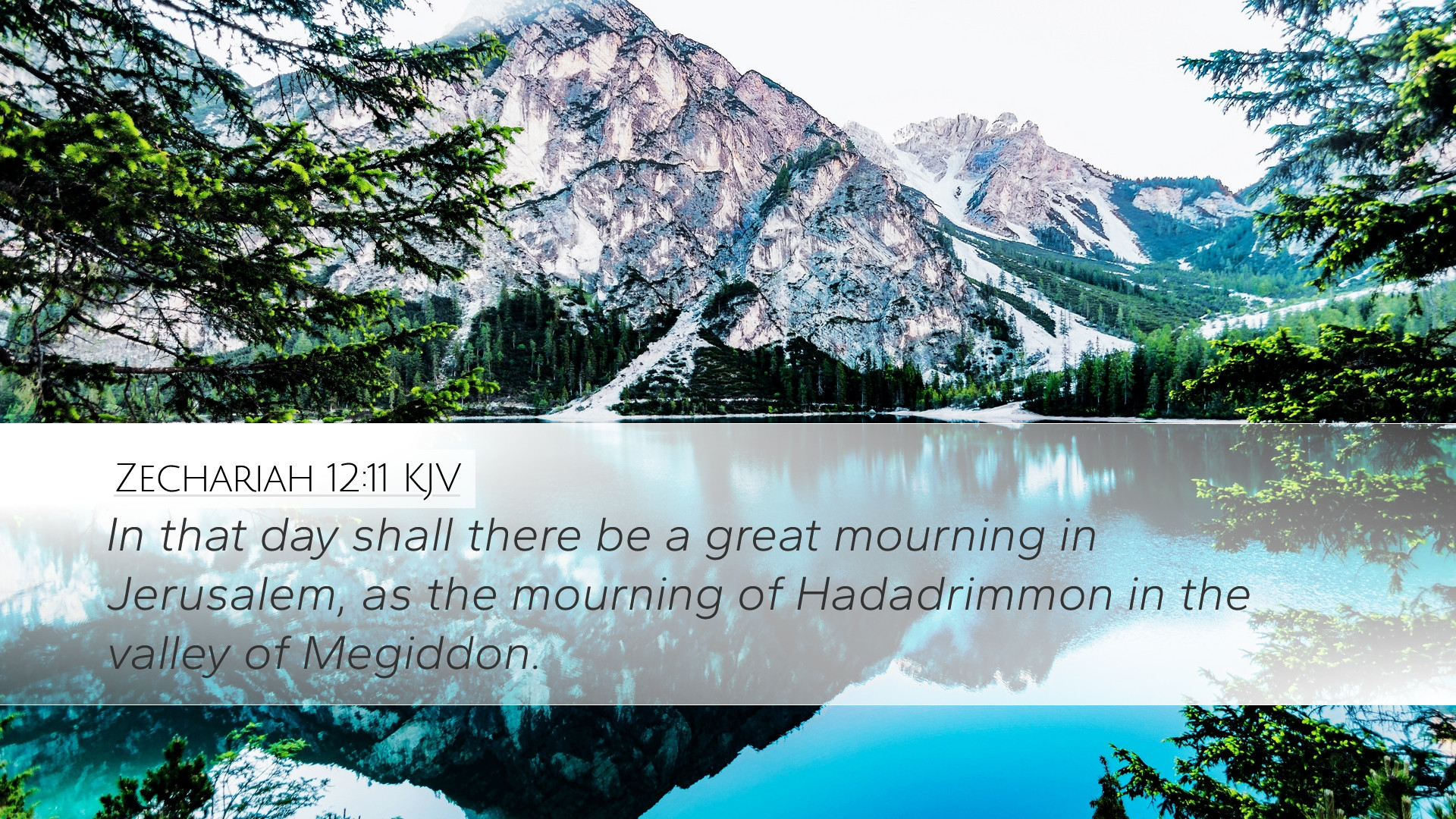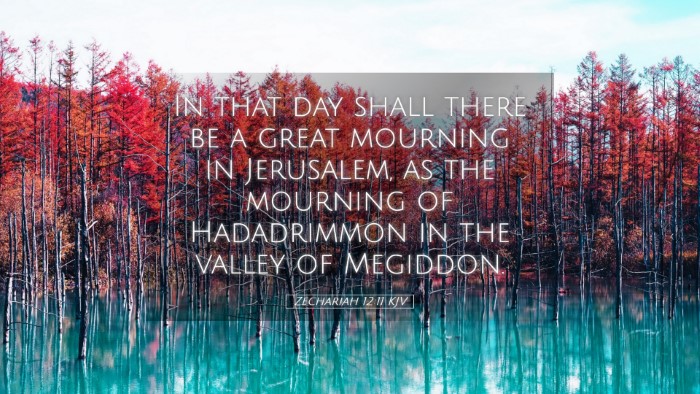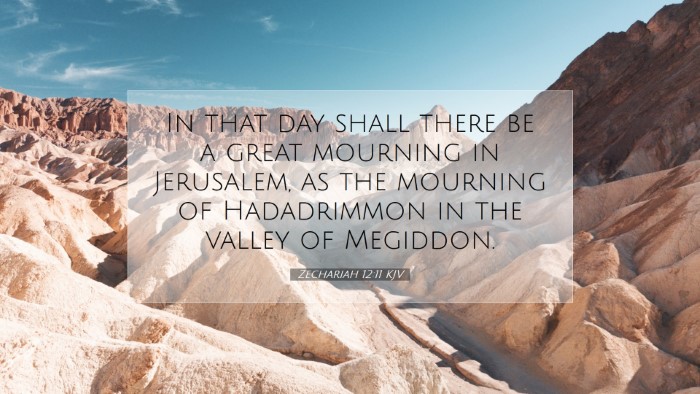Old Testament
Genesis Exodus Leviticus Numbers Deuteronomy Joshua Judges Ruth 1 Samuel 2 Samuel 1 Kings 2 Kings 1 Chronicles 2 Chronicles Ezra Nehemiah Esther Job Psalms Proverbs Ecclesiastes Song of Solomon Isaiah Jeremiah Lamentations Ezekiel Daniel Hosea Joel Amos Obadiah Jonah Micah Nahum Habakkuk Zephaniah Haggai Zechariah MalachiZechariah 12:11
Zechariah 12:11 KJV
In that day shall there be a great mourning in Jerusalem, as the mourning of Hadadrimmon in the valley of Megiddon.
Zechariah 12:11 Bible Commentary
Commentary on Zechariah 12:11
Zechariah 12:11 states: "In that day there shall be a great mourning in Jerusalem, as the mourning of Hadadrimmon in the valley of Megiddo." This profound verse is rich in theological significance and profound implications for understanding both historical and eschatological themes within Scripture.
Contextual Background
To appreciate the depth of Zechariah 12:11, one must consider its historical and prophetic context. Zechariah, a post-exilic prophet, speaks to the restored Jewish community after their return from Babylonian captivity. His prophecies often blend immediate concerns regarding the rebuilding of Jerusalem with eschatological visions pertaining to the coming of the Messiah and the ultimate restoration of Israel.
Historical Significance
The reference to mourning invokes the memory of a significant historical moment—the death of King Josiah at Megiddo, where Hadadrimmon, associated with national grief, marks a moment of loss for Israel (2 Kings 23:29-30). This serving as a poignant reminder of the national tragedies faced by the people of God, sets the stage for Zechariah’s prophetic lament.
Insights from Commentaries
Matthew Henry's Commentary
Matthew Henry emphasizes that this mourning symbolizes deep repentance and a collective awakening among the people of Israel. He argues that genuine sorrow for sin precedes the experience of divine mercy. According to Henry, this passage portrays a significant spiritual revival where individuals start recognizing the Messiah they have rejected.
Albert Barnes' Notes
Albert Barnes interprets the mourning in Jerusalem as a result of recognizing the one whom they have "pierced." He elaborates that this verse foreshadows the profound grief that accompanies the acknowledgment of sin and the need for redemption. Barnes connects this sorrow with the prophecy of repentance, leading ultimately to salvation, suggesting that Israel shall be saved when a national recognition of sin occurs.
Adam Clarke's Commentary
Adam Clarke highlights the enormity of the mourning described, suggesting that it stands in sharp contrast to earlier jubilation noted in the prophets. He reasons that this mourning results in a significant turning towards God, a theme resonant throughout the prophetic literature. Clarke points out that like Hadadrimmon, known for its deep emotional connotations, this mourning speaks not only of sorrow but also of a profound transformation of the heart.
Theological Implications
Beyond its historical context, Zechariah 12:11 invites theological reflection on themes of repentance, redemption, and the nature of God’s covenant people. The mourning signals a communal recognition of existential neediness before God and is a precursor to re-establishing a right relationship with Him. It serves as a metaphor for the inner spiritual state of humanity—often blind and resistant to divine truth until confronted with their deep need for a Savior.
Repentance and Restoration
- Collective Mourning: The verse implies a national turning. Genuine awakening usually surfaces through collective grief and contrition.
- Anticipation of the Messiah: The mourning recalls a future recognition of Jesus Christ among the Jewish people, prompting a restoration of covenantal faith.
Eschatological Context
This verse is often viewed as eschatological, wherein some interpretations calculate its fulfillment during the Second Coming of Christ. The "great mourning" signals a climactic revelation of divine truth, wherein Israel will turn to the Messiah whom they had previously rejected.
The Hope of Redemption
Though the verse speaks of mourning, it also holds the promise of redemption. Within this collective grief lies the seed of hope. Zechariah’s prophecy assures readers that sorrow can precede spiritual awakening and revival.
Conclusion
In summary, Zechariah 12:11 encapsulates a passage of both historical reflection and prophetic promise. Through the lens of public domain commentaries, we glean insights into its rich theological implications. For pastors, students, and scholars, this verse becomes a reminder of the necessity of repentance, the profound reality of communal grief in recognizing sin, and the hope of restoration offered through Christ. It beckons us to engage deeply with scriptural truths that challenge and transform, leading us towards a profound relationship with our Creator.


